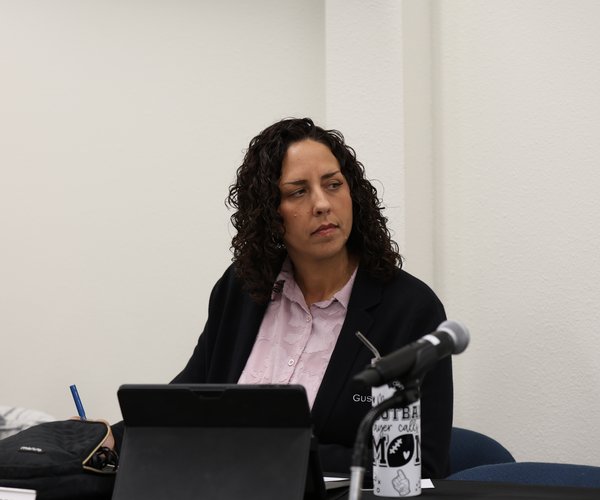The City of Gustine hosted a Special Event Planning Policy Meeting at City Hall last week, where city staff, community organizations, local businesses, and clubs gathered to discuss updates to the city’s event permitting process.
The meeting was led by City Manager Soknirorn Than, Gustine Recreation Coordinator Tiffany Vitorino, and Economic/Community Development Director Jami Westervelt. City Council members Sherri Marsigli, Blake Giles, and Mark Melville were also in attendance.
The purpose of the meeting was to review the city’s updated special event policy, ensure fairness and consistency in event permitting, and gather feedback from community stakeholders.
Vitorino opened the meeting by explaining that the goal of the updated policy is to eliminate inconsistencies that have occurred due to changes in city management over the years.
“We have several special events, some of which are city-sponsored, while others are organized by different community groups,” Vitorino said. “Between different city managers and staff, the process has changed year by year. Some vendor fairs, for example, have had different requirements for business licenses depending on who was in charge at the time. What we’re trying to do now is create a consistent process where everyone is treated the same and follows the same regulations.”
Than emphasized that the policy is meant to be a collaborative effort between the city and the community.
“This isn’t a “Tiffany policy” or a “Than policy” it’s our policy,” Than explained. “It needs to work for our entire community, which is why we have council members here. Ultimately, this will go back to the council for a final review and public hearing so that everyone in the city has a chance to provide input.”
Than also clarified that while three council members were present, no formal action could be taken at the meeting due to quorum rules.
“This is an advisory meeting, meaning no decisions will be made tonight,” Than noted. “Our goal is to gather comments and make improvements before bringing the final version to the city council.”
One of the main topics discussed was the definition of a special event and whether private property events fall under city regulations.
According to the draft policy, a special event is any planned activity that takes place on public or private property outside its normal use and has a significant impact on city services, businesses, or neighborhoods. Examples include parades, fairs, festivals, concerts, car shows, and athletic events.
A question was raised about whether private residential events would be subject to special event regulations.
Than explained, “If you’re hosting a private party at your house with invited guests and not blocking streets or exceeding noise ordinances, it’s not a special event. However, if you’re closing sidewalks or streets, or if the nature of the event disrupts public spaces, it may require a permit.”
Joe Machado of the Gustine Pentecost Society pointed out that the meeting times made it difficult for working residents to attend and expressed concerns about regulations applying to buildings specifically designed for gatherings.
“For example, our facility was built 80 years ago for gatherings and events,” Machado said. “It was designed for that purpose, so restricting our ability to hold events there would defeat the definition of a special event.”
Than agreed, stating, “If a building like the Gustine Pentecost Society Hall is designed for gatherings and is being used for that purpose, then a private rental for a wedding, for example, would not be classified as a special event. We want to make sure the definition is clear.”
One of the key debates during the meeting was whether 50 attendees was an appropriate threshold for requiring a special event permit.
Councilmember Marsigli raised the question, “Is 50 the right number? Should it be 75 before an event is classified as a special event?”
Rich Martin of the Gustine Pentecost Society argued that requiring a permit for gatherings of 50 people at a private residence seemed excessive.
“My private home is not a public place,” Martin stated. “If we’re talking about public spaces, that’s one thing, but 50 people in my home shouldn’t require special regulation.”
Councilmember Marsigli agreed, sharing, “I have at least 80 people in and out of my house on the Fourth of July. That shouldn’t require a permit.”
Than confirmed that the city would revise the language to clarify that the 50-person threshold applies to public gatherings rather than private homes.
Several attendees expressed concerns about the cost of hosting events in Gustine, particularly fees for city services such as public safety and public works overtime.
“All permit fees go directly to the general fund, which supports city services,” Than explained. “We’ll be presenting a formal report to the council showing how much was spent on special event services last year.”
Marsigli noted that some events, such as charity fundraisers, have had their fees waived.
“There have been fee waivers for events like the pickleball tournament raising money for Valley Children’s Hospital,” Marsigli said. “So, there needs to be consistency in how fee waivers are granted.”
The discussion also covered vendor permits and compliance with county health regulations.
Marsigli raised concerns that certain businesses, such as Whichcraft Tap Room, are being required to obtain unnecessary permits when they already have business licenses.
“I don’t think the Tap Room should have to get a special permit every time they bring in a food vendor,” Marsigli said. “They already have their licenses, insurance, and permits, as do the vendors they work with.”
Than responded that county health regulations dictate whether certain vendors require special event permits.
“Merced County requires a one-day food permit for vendors who aren’t licensed caterers,” Than explained. “That’s why some of these events get classified as special events.”
The conversation also touched on noise ordinances, with attendees expressing concerns that most events naturally exceed noise limits.
“Almost any event is going to go over the noise ordinance,” one attendee commented.
Than acknowledged the difficulty in enforcement but noted that the ordinance exists to prevent disruptions to residential areas.
Councilmember Giles proposed streamlining the application process with an online system that allows repeat event organizers to pre-fill their information for faster approvals.
“If vendors and event organizers have already submitted their information in the past, they should be able to reuse it rather than filling out everything from scratch,” Giles suggested.
Vitorino agreed, noting that a similar system had been used before and could be expanded.
As the meeting wrapped up, Than explained that all feedback from the meeting would be compiled and used to revise the policy before it is presented to the city council for final review.
“We’ll take all the comments from tonight, revise the draft, and bring it back to the council for public input,” Than said.
Marsigli suggested changing the wording in the policy from “shall not advertise to should not advertise” to clarify that event promotion is not restricted but should be done cautiously to avoid scheduling conflicts.”
Business owner Andrew Quintal supported the change, stating, “People just need to do their homework before promoting an event.”
Vitorino added, “If an event needs to be rescheduled due to unforeseen issues, like a roundabout closure, pre-advertising could create unnecessary frustrations.”
The next public meeting on the Event Planning Policy will be scheduled in the coming weeks, with city officials encouraging further community input.





